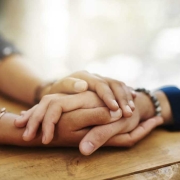Book Recommendations for Adult Survivors of Childhood Abuse During the Holidays
The holiday season is a stressful time of year for most everyone but for survivors of childhood abuse and neglect it may be especially difficult. Holidays that are also the anniversary of trauma can be the most painful form of re-experiencing for survivors and their families. We offer the following recommendations from authors we trust to provide you with valuable information, validation, treatment strategies, and hope.
These resources — books, videos and websites — are designed to give beneficial perspectives for various aspects of the healing process. However, if you find that engaging with the information is triggering for you in the moment, just set it aside and do grounding exercises. You can always come back to it later.
And, throughout this season remember to take care of yourself. We suggest that you set good boundaries and communicate them to others, allow yourself time to grieve, work on creating new memories and traditions, and above all else, be gentle with yourself. This stuff is hard but well worth the effort!
Books on how trauma affects the brain, body, and nervous system, and interventions for recovery:
- Bessel van der Kolk: The Body Keeps the Score: Mind, Brain and Body in the Transformation of Trauma
- Bessel van der Kolk: Traumatic Stress: The Effects of Overwhelming Experience on the Mind, Body, and Society
- Babette Rothschild: The Body Remembers: The Psychophysiology of Trauma and Trauma Treatment
- Babette Rothschild: 8 Keys to Safe Trauma Recovery: Take-Charge Strategies to Empower Your Healing
- Janina Fisher: Healing the Fragmented Selves of Trauma Survivors
- Janina Fisher: Transforming The Living Legacy of Trauma: A Workbook for Survivors and Therapists
- Peter Levine: In an Unspoken Voice: How the body Releases Trauma and Restores Goodness
- Peter Levine: Waking the Tiger: Healing Trauma
Books/Resources on building resilience and dealing with the feelings of shame and vulnerability:
- Linda Graham: Bouncing Back: Rewiring Your Brain for Maximum Resilience and Well-Being
- Brené Brown: The Gifts of Imperfection: Your Guide to a WholeHearted Life
- Brené Brown: The Power of Vulnerability TED Talk
- Brené Brown: Unlocking Us Podcast
Book/Resources on mindfulness, self-compassion, and radical acceptance:
- Christopher Germer: The Mindful Path to Self-Compassion
- Kristin Neff and Christopher Germer: The Mindful Self-Compassion Workbook: A Proven Way to Accept Yourself, Build Inner Strength, and Thrive
- Kristin Neff: Self-Compassion: The Proven Power of Being Kind to Yourself
- Tara Brach: Radical Acceptance: Embracing Your Life With the Heart of a Buddha
- Tara Brach: True Refuge: Finding Peace and Freedom in Your Own Awakened Heart
Wondering where to begin?
For information about trauma in the body and helpful interventions:
The Body Keeps the Score: Mind, Brain and Body in the Transformation of Trauma by Bessel van der Kolk
There are many useful books when it comes to understanding how trauma affects the body/mind connection, and because different authors will resonate with each of us in different ways we are listing several that can be helpful. However, one stands out in its ability to reach a large number of people. The Body Keeps the Score: Mind, Brain and Body in the Transformation of Trauma by Bessel van der Kolk has remained on the the New York Times best sellers list for over four years now — and some of that time it was #1 on the list! Pretty incredible for a book on trauma that was released more than eight years ago.
In The Body Keeps the Score, van der Kolk seeks to take away the shame of trauma and normalize trauma responses in the process. He encourages the reader to recognize the powerful connections between mind and body drawing on his own personal experience, his work with patients, and his in-depth research to recommend treatment methods such as mindfulness, yoga, and EMDR. He also recognizes that human connection — safe connection and communication with another human being — is one of the most important and effective ways to heal the wounds of past and live more fully.
Why read this book?
- To understand how the body actually does keep the score. Overwhelming experiences that remain unprocessed can continue to effect how you think about yourself, how your react to stress, your physical well-being and your ability to connect with others:
- To learn the healing power of techniques ranging from age-old practices (meditation, martial arts, theater and yoga) to modern day mind/body therapies (EMDR) and cutting edge neuroscience (neuro-biofeedback).
- To understand the extraordinary growth and resilience that is born out of surviving and healing trauma.
- Bessel van der Kolk is the founder and medical director of the Trauma Research Foundation in Brookline, Massachusetts and is a professor of psychiatry at Boston University Medical School. Through training, research, and his own life experiences Bessel van der Kolk is an expert in the physiology and neuroscience of trauma. A psychiatrist who is people-oriented rather than pill-based, his writings provide relevant and accessible information on how to adapt to traumatic experiences.
For building resilience:
Bouncing Back: Rewiring Your Brain for Maximum Resilience and Well-Being by Linda Graham
Linda Graham is an experienced psychotherapist who lectures internationally on mindfulness skills and resilience exercises to help rebuild our core well-being, cultivate positive emotions, and develop healthier relationships. There is something so optimistic and comforting in the understanding that brains really can be re-wired and that resilience is innate in our being.
Why read this book?
- Learn to cultivate positive emotions – gratitude, kindness, compassion, awe, joy, delight – that foster more openness to learning, more optimism, more learning and growth, and lead directly to more resilience.
- Learn dozens of powerful strategies that create new habits of coping and building a mindset that allows you to transform adversity into learning and growth.
- Explore the lifestyle choices and practices that maintain your capacities and strategies for resilience over the long haul.
For exploring courage, vulnerability and shame:
The Gifts of Imperfection: Your Guide to a WholeHearted Life by Brene Brown
Your Guide to a WholeHearted Life is always an easy and heartening read. Brown is often profound, sometimes profane, and can be laugh-out-loud funny in her compassionate exploration of human emotions. She helps us understand that imperfections aren’t inadequacies, just reminders that we’re all in this together. Also, go to brenebrown.com for a complete list of books, podcasts, assessments, and other guides on courage, vulnerability, shame and empathy.
For exploring mindfulness and self-compassion:
The website self-compassion.org is a fantastic resource. You can test your own levels of self-compassion in areas such as self-judgment, isolation, over-identification, and common humanity. The website also explains why self-compassion is so important and provides many guided practices and exercises to help you along your healing path.
We are here for you, and we want to help.
Our goal is to return you to optimal health as soon as possible. To schedule an appointment please call: 703-532-4892 x2
This post was originally published in December 2022. It was reviewed on October 14, 2024.





Leave a Reply
Want to join the discussion?Feel free to contribute!